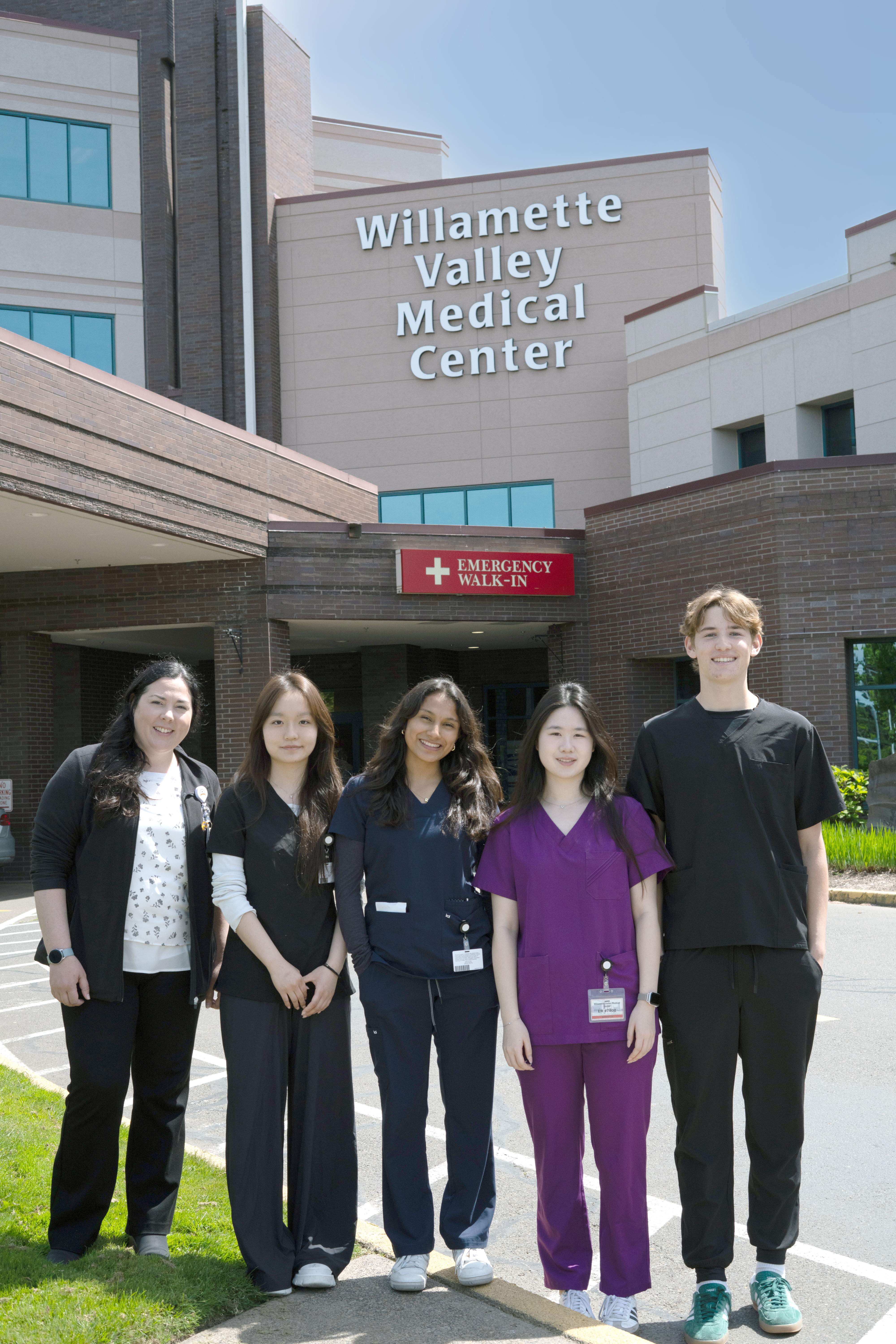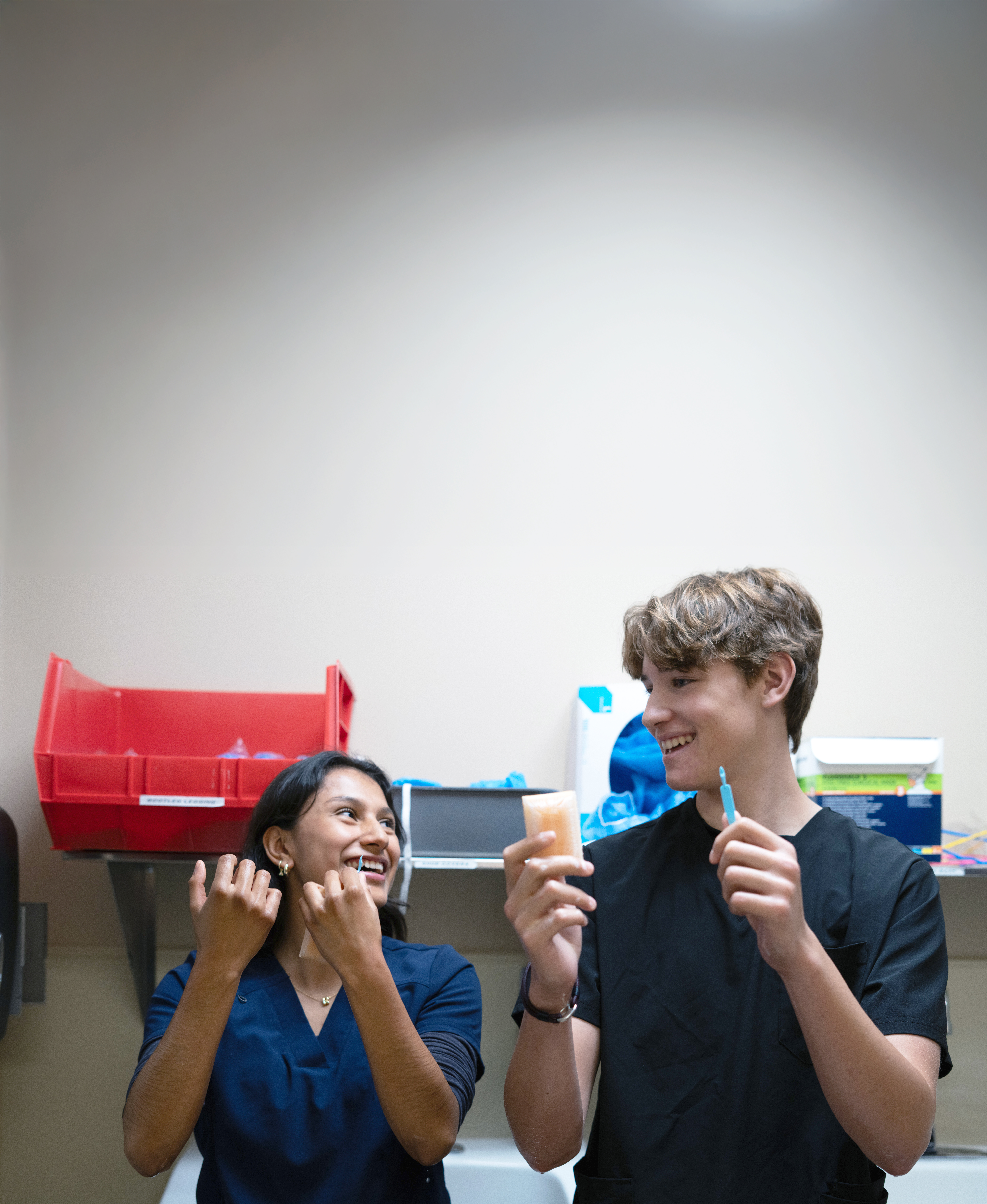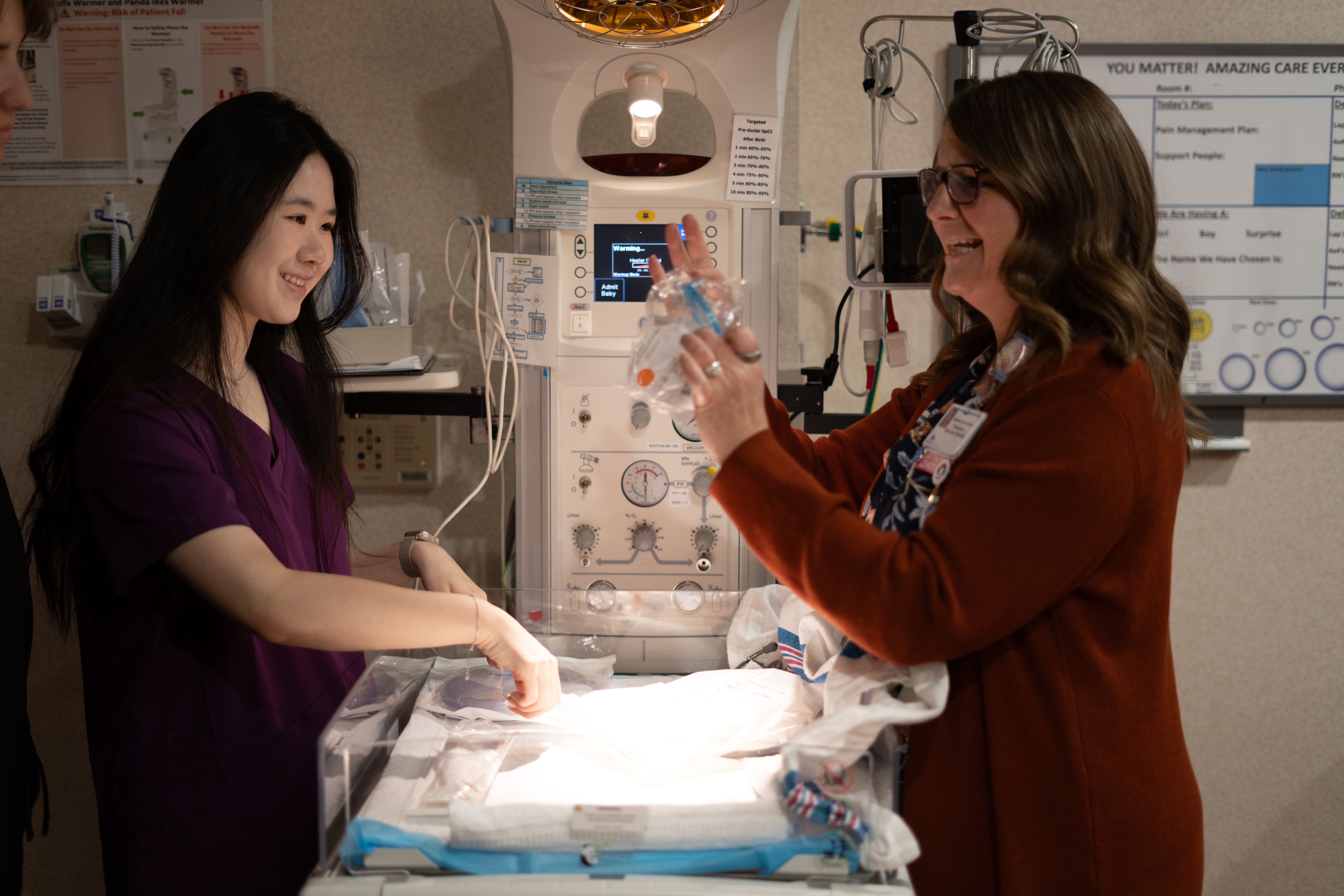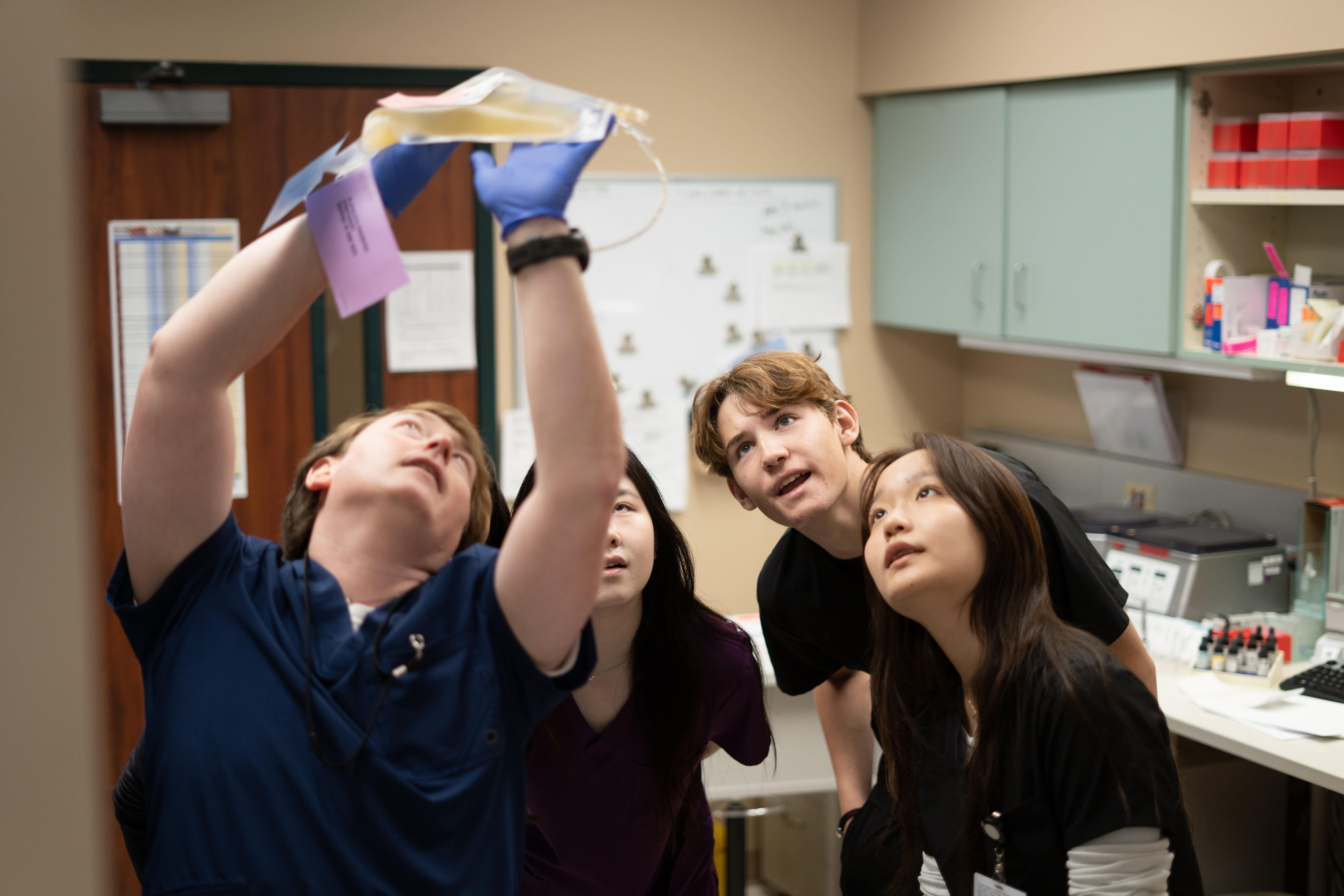
10 minute read
Pioneering Paths
Pioneering Paths
Students Explore Careers in Medicine
Form 7 students Regina Romero-Bolaños and Selina Li have taken the required Form 7 career interest apprenticeship project to a new level this year by actively pursuing their interests in the medical field. For their projects, they have not only spent hours interning with hospital professionals at McMinnville’s Willamette Valley Medical Center, but they have also taken on the leadership responsibility of coordinating and organizing internship opportunities for other students to explore career possibilities in the medical field. The following is an interview done with them mid-project.
Delphian Magazine: Could you tell us how you both became involved in this project?
Regina Romero-Bolaños: Last year, apprenticeships were happening at the hospital in McMinnville that I had been involved in, but this year was going to be bigger and more involved to give students more opportunities to explore their interests. The Assistant Head of School, Mark Siegel, whose connections with the McMinnville Chamber of Commerce made this whole project possible, simply announced the project opportunity in the Upper School at the beginning of the school year. I was one of the first students to let him know I was interested, and he said, “Okay, great, you’re running it.”
Selina Li: For me, I had been actively looking for some internship opportunities in the medical field and approached Mark to see if he had any connections. He let me know about this project and said, “Okay, you’re in charge now.” From there, the first step was meeting with the hospital’s business manager to learn more about our responsibilities.

DM: As the project managers, what have been your responsibilities?
RRB: We first needed to get together a group of students for the project. Because the project was at a hospital, students were required to be at least sixteen, to wear scrubs when they were working, and to sign both a HIPAA agreement form and a contract agreeing to the hospital rules and standards. Finally we had to participate in a hospital orientation and training seminar that we organized here on campus with the hospital’s education coordinator.
SL: Once the students had completed this training process, they needed to select a department in which they would like to do a rotation and coordinate a schedule directly with the hospital’s department head to shadow for two four-hour shifts. So that’s eight hours total for each rotation.
DM: Was it at all intimidating for you and the other students to initiate contact with the hospital’s department heads?
SL: In the Business Seminar that Mark leads, learning how to write professional emails is part of the curriculum. However, Regina and I also collaborated closely with Mark to develop a template for the students to use when reaching out to department heads at the hospital. As part of the training for the students, we emphasized the importance of professionalism in this project to ensure that future students can participate in it after us.
RRB: We worked with the students, reminding them that the people they email at the hospital are taking the time away from helping patients to read our messages. It is the least we can do to keep our messages brief, clear, accurate, and thoroughly proofread before sending.
SL: We also went over basic manners points for being at the hospital, such as not playing with your hair or chewing on your nails, avoiding casual chit-chat, not being on your phone, maintaining a neat appearance, dressing professionally, etc.
Additionally, once students were signed up for their rotations and had their schedules, we help to arrange transportation from the school to the hospital. Some weeks, students are going in almost every day of the week for different shifts.

DM: Which departments have you done a rotation in so far?
SL: I’ve worked in orthopedics, the lab, and I have surgery and nutrition coming up. Orthopedics was particularly interesting because I had no prior knowledge of how a knee or hip replacement worked. I asked as many questions as I could between patients, and Dr. Thomas was kind and explained things really well to me. I also took tons of notes.
Also, the lab was totally different but also really interesting. I shadowed two lab specialists: one working in hematology and the other in microbiology. They were testing samples from urine, stool, and blood. This happened to be around the same time I was doing the biology course here at Delphian, and I was learning about protein synthesis, so it was cool to be able to understand the language she was using and to be able to ask intelligent questions. I was mistaken for a college student at one point, and they were surprised to learn I’m only in high school.
During my lab rotation, a patient required a blood transfusion, which isn’t a common occurrence at the McMinnville hospital. I was fortunate enough to be able to see this event firsthand. It was fascinating to be present when the Red Cross delivered blood and to witness the entire process from a lab perspective.
RRB: I’ve done a rotation in the cancer center, imaging and radiology, short stay, and medical surgery. At the cancer center, I had the opportunity to meet patients with various types of cancers and attend their appointments with their oncologists. It was very educational for me to see the work the doctors and nurses were doing, as well as the patients’ attitudes—despite what they were going through, they remained positive. That experience has stuck with me and probably will for the rest of my life.
During my other rotations, I had the opportunity to observe various types of imaging procedures, ranging from angiograms to CT scans. I watched a pacemaker battery get replaced in the cardiac cath lab. I was able to see a defibrillator in use when a patient went into cardiac arrest. Overall, my biggest takeaway is learning about the various careers in the field—it’s not just doctors and nurses, and there are so many different educational paths to working in the healthcare field.

DM: What other sorts of skills have you found yourselves needing as the project leaders and on your rotations?
SL: The skills I learned in the communication seminar and in the Planning and Organization course. I also applied what I learned from The Education Handbook for Teens course when helping to talk to students and explain things.
RRB: I’d say the Planning and Organization course for sure—there were so many moving pieces in this project that making an administrative scale and full program with action steps to help get everything organized and done really helped to make it successful.
Additionally, The Study Handbook was helpful because there’s a lot of terminology in medicine. As project leaders, we assigned the students to research the departments they would be interning with before they arrived, so they could understand the language and have some context. We also asked them to bring a notebook and a pencil to write down anything they wanted to review or clarify later. Additionally, the doctors and staff were very easy to talk to. You could ask them, “What does that mean?” and they would explain it to you.
While in the hospital, this helped me not only appear really engaged and interested as I wrote notes, but it also allowed me to add question marks that I could then look up later to clarify any misunderstandings or learn more about a topic in-depth.
DM: How has this experience changed your interest in going into the medical field?
RRB: It’s definitely solidified it!
The amount of work to go into medicine can be a bit daunting for some. This project made me realize that there are many more paths into the medical field than I had previously thought. Thanks to meeting and interviewing professionals about their paths, the whole process became much more comfortable for me.
Also, going in, I wasn’t totally sure if I would like the work. This project reminded me of what I already knew, which is that I do like being with patients, studying, and I’m not afraid of bodily fluids. I can handle it, and I actually enjoy it.

SL: I’m from China, and the medical system is totally different there from the U.S. I did an internship in China, and so it was really interesting to have this opportunity to experience how things work here as a comparison, because I want to attend college in the United States. Before the project, I was still asking myself questions like, “Do I really want to go into medicine or do I actually like lab work?” I knew I liked chemistry and biology, but didn’t know what lab life would be like. Now that I’ve had a taste, I want to explore more types of labs as well. It has given me insight and more certainty about my career.
DM: Would you say the medical field felt intimidating before this?
SL: Totally. I was so nervous on the first day. I wasn’t raised or born here, and everything was so different. Additionally, this was my first time since arriving in the U.S. where I was truly on my own, without any friends or family around me, in a department with 30 or 50 professionals who were so knowledgeable. I was scared of making a mistake.
All the doctors used to seem intimidating, even though I want to become one. I didn’t know if I should go for a PA, CRNA, MD, or maybe even a PhD. Or maybe nursing school first, then figure things out later? It felt unclear. I was just like, “Study hard, and maybe something will happen someday.”
But then I met the people at the hospital, and they were kind, helpful, and didn’t mind taking their time to explain things. There’s a person named Pearl who works in the lab—she’s Taiwanese like me—and she was like, “Oh my gosh, contact me! I can tell you how I got my job.”
It’s not that the path is shorter or longer; I have more clarity. I understand the steps to success a bit better. So, even if it’s still a long journey, the career I want is real, and achieving it is no longer as scary, confusing, or overwhelming as it used to seem.
RRB: The project helped make everything more real. Like, now it feels possible. We can do it. It’s not just some dream far off in the distance—it’s reachable. I think that was a big part of why Mark wanted us to do this: so we could explore different careers and see that it is possible to get there.










